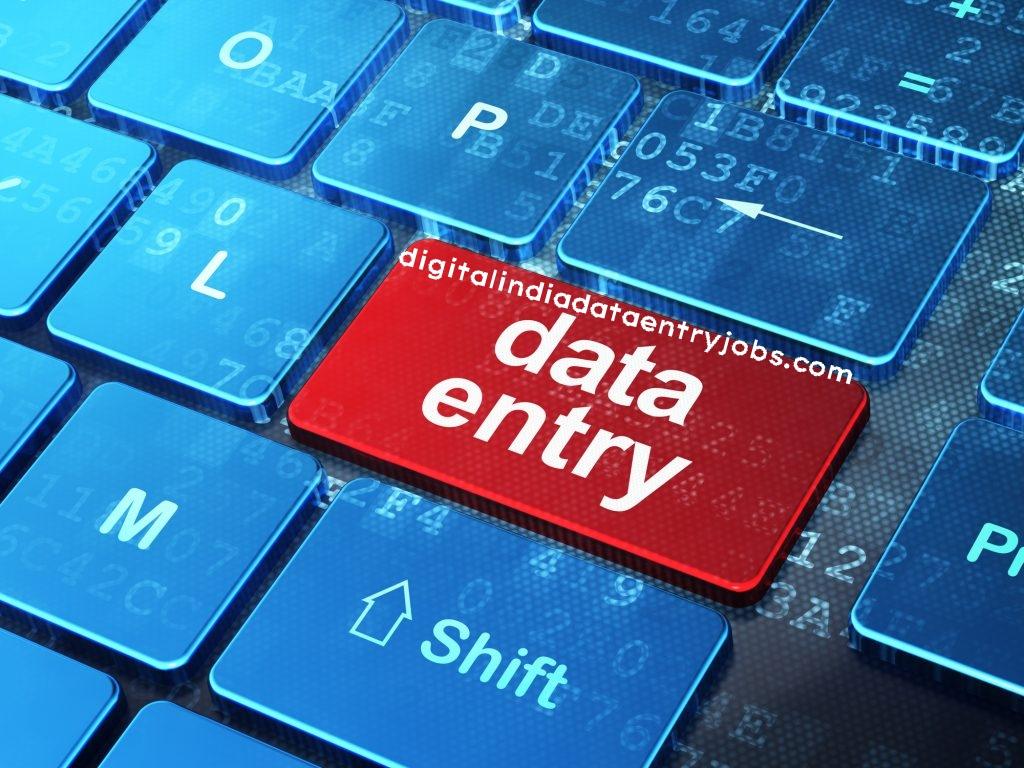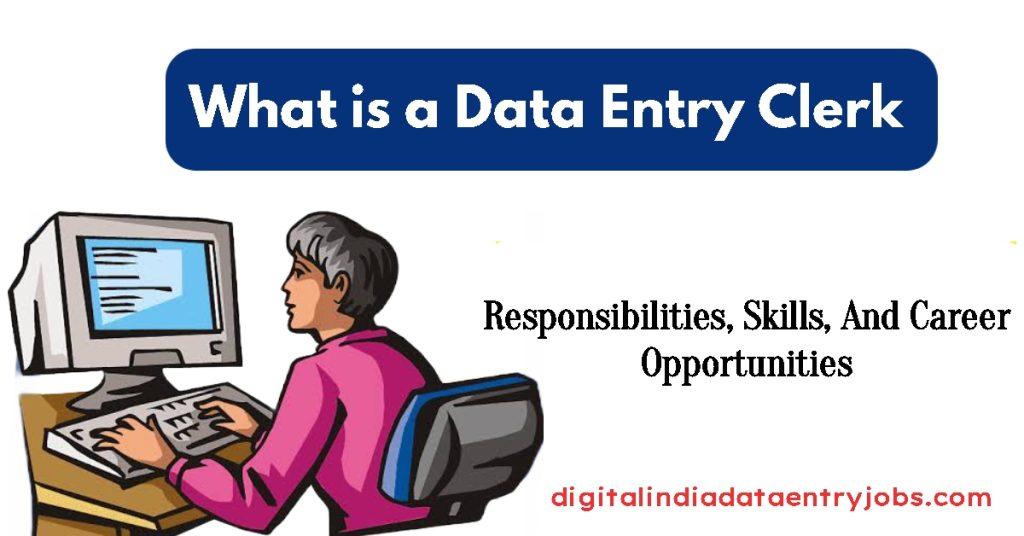What is a Data Entry Clerk:- How do you deal with the issue of occasionally being completely impoverished? As more businesses come to understand the benefits of outsourcing, the overall impression of remote work is rapidly shifting thanks to new technologies. On the other hand, workers are now so worried about finding a work-life balance that they consider factors other than compensation, location, and possibility for advancement when making a professional decision.
An excellent illustration of a popular online job in the context of the gig economy is data entry. It can be undertaken as a full-time remote career or as a side gig and frequently requires no prior expertise to get started. To assist you in determining if a career as a data entry clerk is suited for you, this article provides you with information.
Contents
What Does a Data Entry Clerk Do?
To accomplish corporate objectives, a data entry clerk, also known as a data entry operator, is essentially in charge of entering data into databases and computer system applications. They obtain this data from forms, company files, and applications.
Data entry tasks in contemporary business setups typically include checking firm data, organizing files, and gathering and classifying papers to be ready for future projects. Data entry clerks may also review data as part of their regular tasks to find and fix mistakes and flaws that could affect the final product.
This area has been gaining momentum every day because of the recent rise in gig businesses and the increasing realization by businesses of the value of leveraging their clerical positions.

Also Read:- What is Data Entry, indnewsupdates.com, Digitizeindiagov
Responsibilities
The main duty of a data entry clerk is to accurately enter data into different databases and systems. High levels of attention to detail and the capacity for sustained concentration are necessary for this work. You support the information’s overall integrity and quality control by making sure the data you submit is accurate.
Key Responsibilities of a Data Entry Clerk
- transferring and updating data with precision into pertinent databases
- checking and examining data to ensure accuracy and completeness, and making any required corrections
- obtaining information as required from databases or electronic files
- Making regular backups to guarantee the preservation of data
- filing and gathering information to be input into the computer
- When necessary, scanning papers and printing files
- preserving the privacy of critical client or business information
- observing security and data integrity regulations
- producing reports, backing up data, and keeping finished work in specified places
- searching through data to find relevant information
- ensuring appropriate usage of office supplies and fixing any issues
- coordinating to expedite data entry procedures with the IT team, management, and other employees
Qualifications and Requirements
Learn how to use computers and keyboards, as well as other fundamental hardware and software, before taking on the role of a proficient remote data entry clerk. For data entry operators to be eligible for new positions in the industry, post-secondary education or college degrees are not always prerequisites. Therefore, while applying for a job, a General Educational Development (GED) or a basic high school diploma will most likely satisfy the requirements.
Getting certified is one of the easiest methods to work as a data entry operator. The qualifications you will receive from community colleges and vocational institutions add credibility to your resume and could ultimately place you ahead of the competition, even though this path is never required.
In conclusion, the following abilities are necessary for you to develop into a capable and productive data entry clerk in any kind of business:
- A high school diploma
- Excellent communication skills
- Good command of the English language
- Exceptional typing skills
Types of Data Entry Work
There are many different types of data entry jobs, with an emphasis on specialized abilities needed for particular industries. Even though data entry clerks’ jobs may overlap, many employers are eager to recruit skilled professionals who are aware of the organization’s strategic needs.
As will be detailed below, data entry occupations may currently be divided into five major groups.
1. Data Collection
To put it simply, data collection is the process of gathering, confirming, and assessing information on particular variables. Typically, it serves to confirm the potential results of a study endeavor.
It is often possible to collect data via phone, in person, or online using the following forms:
- Surveys
- Interviews
- Observation
2. Data Annotation
Given the rapid rise in popularity of artificial intelligence (AI) and machine learning, it was only a matter of time before the labor market again diversified to accommodate data annotators/labelers. Data annotation, in its most basic form, is the labeling of data in various formats to facilitate computer understanding. The annotation of text, photos, audio, video, and voice are among the most often used media.
Improving your computer abilities is one of the simplest methods to get ready for a profession as a data annotator.
3. Data Cleaning
Finding and eliminating mistakes from databases and tables is the process of data cleaning, also referred to as cleansing. This could be an Excel file, a Word document, or another type of file.
There are various reasons to perform data cleansing, including enhancing data completeness, accuracy, validity, and uniformity. Here, you might have to add, remove, or alter particular details to make the content more applicable to actual situations.
4. Automated Data Capture
On the other hand, automated data capture entails entering data into a computer database system without assistance from a human. Among other techniques, magnetic stripes, barcodes, optical recognition (OMR and OCR), and radio frequency identification systems can be used for this procedure, which is also known as electronic data capture.
Not only is automated data collection incredibly cost-effective, but it also significantly lowers errors in comparison to the majority of conventional data collection techniques.

Also Read:- Data Entry Jobs, Nebsit Council, Companycontactdetail
5. Manual Data Input
You guessed correctly. The opposite of the previously described automated data-collecting method is manual data input, which enables you to manually enter data into a database or piece of software. This can take the form of text, audio, video, or image input.
Data entry by typists, who input text into word processing programs such as Microsoft Word, is a well-known example of this kind of employment. The positions of captioner and transcriptionist are two other well-known examples that fit into this group.
What are the Potential Earnings from Data Entry?
The Bureau of Labour Statistics reports that the average hourly income for a data entry keyer in the United States is about $15. This worth rapidly drops to approximately roughly $10 per hour for those who are just starting in the industry. Conversely, experienced data entry workers typically receive a guarantee of up to $22 per hour, irrespective of the businesses they choose to work for.
Note that the real compensation potential varies significantly based on many criteria, including your position within the organization, your level of ability and experience, the complexity of the jobs you are doing, and your overall working pace.
Companies that Offer Data Entry Jobs
One of the most difficult things an aspiring data entry clerk will have to deal with is sorting through internet sources to separate trustworthy businesses from con artists. Fortunately, we have you covered.
Here is a list of some of the top data entry firms now accepting new clients.
Crowdsourcing companies
- TELUS International AI (formerly Lionbridge AI) (company review)
- Appen (company review)
- Clickworker (company review)
- Amazon Mechanical Turk (company review)
Freelance Marketplaces
- Upwork
- Freelancer
- Fiverr
- PeoplePerHour

Also Read:- Data Entry Jobs from Home, Uidaionlineaadharcard, scholarships gov
FAQs
Q.) In what ways do data entry clerks work together with other teams in an organization?
Ans. For numerous departments to have correct and well-organized data, data entry clerks are essential. They collaborate closely with IT to ensure database integrity, help HR with employee records, help finance with invoice input, and supply essential customer data to sales and marketing teams. Their careful data management makes it easier for departments to work together, which promotes efficient workflows and well-informed decision-making throughout the business.
Q.) What are some typical problems that data entry clerks encounter?
Ans. Data entry clerks frequently struggle with tedious jobs that might cause mistakes and weariness. They need to be extremely focused and detail-oriented to sustain high accuracy levels in the face of repetitive input. They also have the burden of keeping data confidential while adhering to strict timelines. Other frequent difficulties include adjusting to different data management systems and keeping up with software changes. For clerks to increase productivity and accuracy in their work, they must practice effective time management and ongoing skill development.
Q.) How do data entry clerks often advance in their careers?
Ans. Data entry clerks frequently focus on accuracy and speed when they first start their employment. As they gain expertise, they could advance to become Data Entry Specialists and handle more challenging jobs like database administration and data verification. Promotion can lead to supervisory positions where one manages processes and supervises the work of other clerks, such as Team Lead or Data Entry Supervisor. Career advancement could lead to professions like data manager or data analyst, which need a deeper comprehension of data processing and interpretation. In the end, they can advance into IT or higher-level management roles with more training and experience. The ability to adjust to changing technology has a major impact on career success in this sector.
#Saras

